9 Feb 2022 | News and features
Since returning home to the Democratic Republic of Congo in the winter of 2020, after spending several years travelling throughout Africa, I found the winds of change blowing over the country. Expectations were high that these winds would bring new freedoms, including freedom of expression and the media, which had been overlooked under the old administration.
But it was not to be. I quickly found that yesterday’s victims – the current ruling party leaders – had turned into the new oppressors. Journalists and thought leaders, even musicians, were arrested, threatened, taken to court and jailed. Others would self-censor to avoid trouble. They did not want to get in trouble with the authorities. The new leader of the DRC, Felix Tshisekedi, failed in his promise to protect the media, just like previous leaders had.

DRC leader Felix Tshisekedi, who has presided over a crackdown on the press. Credit: www.kremlin.ru/Wikimedia
Many would decry the way I reported, saying that I was putting myself in danger. But I was trained in South Africa, where the media is more free. I didn’t want to self-censor. So when Index on Censorship asked me to write about Tshisekedi’s failed promises to put the media first, I accepted.
I did not realise then quite how much it would put me in danger. A few weeks after filing, I was told that those in power were angered by my article and that spies were being sent to look for me. I also heard allegations that a list of anti-regime journalists had been issued by ruling party supporters – each person to be hunted down. Apparently, my name was on that list.
The weeks that followed were a sort of hell. I slept uneasily, fearing for my life. My wife and I were separated – pending a divorce – and on a level that felt like a blessing. At least I knew she and our children would be safe, away from me. If a hitman came to finish me off, I would die alone, and spare the lives of our kids.
I wanted to leave the capital city, my birthplace, but I did not know where to go. At the time I was staying in a hotel due to the breakup of my marriage. I quickly packed a suitcase with my clothes. While I wasn’t sure exactly when or if someone would come for me, I couldn’t take the risk. I left in haste. I didn’t even have time to pick up my trousers and shirt that were being repaired at a makeshift dressmaker.
The money I had was very little. It would be hard to purchase a ticket to West Africa, a region that I love and that I believe is one of the world’s underreported zones. With the money that I did have, I travelled to the troubled east of the country. It wasn’t a decision made lightly. Rather from there it would be relatively easy to cross the border into other, safer countries.
In the DRC’s east many journalists have been killed and others threatened in recent years. The media work under duress. They face threats and attacks from security forces and intelligence agencies, and from armed groups. For example, in October 2020 a radio journalist went into hiding after army generals threatened to kill her.
While there I was told that I had to be very careful; two gunmen in army uniforms had come looking for a journalist near where I was staying. Once again, I started to make plans to leave, and this time round to leave the DRC for good. Again, I had very little money. Index fortunately gave me an advance on my next article, which really helped. It was time to go. Before it is too late.
I went first by ship, the whole night, 100.4 km to the south, then by car crisscrossing mountains, hills and valleys, another 100 km further south, all amid the presence of dozens of armed groups.
I finally made it safely out of the “danger zone”. I was out of reach, both from the government, its army, and militia.
But new challenges quickly emerged. On the way to where I was supposed to go to be able to seek refuge I was robbed. My laptop was taken and all my money. Those who robbed us said that if we ever tried to report the incident to the authorities they would hunt us down. Again, silenced and gagged.
Back to square one. Those days were a struggle. Minimal food and money, no laptop, no phone, no permanent place to stay. I felt hopeless and helpless in a strange country.
I worried about where I would sleep and eat and also about the stories I would struggle to report.
These beautiful and exciting lands have been transformed into a hostile zone run by political leaders who hate the media. I long for West Africa – “my second home”. I want to go there and be at peace and rest. Not to retire though, no, because I firmly believe that I was born to write, expose, criticise and hold the powerful to account.
This account was given to Index in January. Since then the writer has managed to leave the DRC and is reporting for Index in the upcoming 50th anniversary special issue.
26 Oct 2018 | Campaigns -- Featured, Saudi Arabia, Statements

Saudi journalist, Global Opinions columnist for the Washington Post, and former editor-in-chief of Al-Arab News Channel Jamal Khashoggi offers remarks during POMED’s “Mohammed bin Salman’s Saudi Arabia: A Deeper Look”. March 21, 2018, Project on Middle East Democracy (POMED), Washington, DC.
Recognising the fundamental right to express our views, free from repression, we the undersigned civil society organisations call on the international community, including the United Nations, multilateral and regional institutions as well as democratic governments committed to the freedom of expression, to take immediate steps to hold Saudi Arabia accountable for grave human rights violations. The murder of Saudi journalist Jamal Ahmad Khashoggi in the Saudi Consulate in Istanbul on 2 October is only one of many gross and systematic violations committed by the Saudi authorities inside and outside the country. As the International Day to End Impunity for Crimes against Journalists approaches on 2 November, we strongly echo calls for an independent investigation into Khashoggi’s murder, in order to hold those responsible to account.
This case, coupled with the rampant arrests of human rights defenders, including journalists, scholars and women’s rights activists; internal repression; the potential imposition of the death penalty on demonstrators; and the findings of the UN Group of Eminent Experts report which concluded that the Coalition, led by Saudi Arabia, have committed acts that may amount to international crimes in Yemen, all demonstrate Saudi Arabia’s record of gross and systematic human rights violations. Therefore, our organisations further urge the UN General Assembly to suspend Saudi Arabia from the UN Human Rights Council (HRC), in accordance with operative paragraph 8 of the General Assembly resolution 60/251.
Saudi Arabia has never had a reputation for tolerance and respect for human rights, but there were hopes that as Crown Prince Mohammed Bin Salman rolled out his economic plan (Vision 2030), and finally allowed women to drive, there would be a loosening of restrictions on women’s rights, and freedom of expression and assembly. However, prior to the driving ban being lifted in June, women human rights defenders received phone calls warning them to remain silent. The Saudi authorities then arrested dozens of women’s rights defenders (both female and male) who had been campaigning against the driving ban. The Saudi authorities’ crackdown against all forms of dissent has continued to this day.
Khashoggi criticised the arrests of human rights defenders and the reform plans of the Crown Prince, and was living in self-imposed exile in the US. On 2 October 2018, Khashoggi went to the Consulate in Istanbul with his fiancée to complete some paperwork, but never came out. Turkish officials soon claimed there was evidence that he was murdered in the Consulate, but Saudi officials did not admit he had been murdered until more than two weeks later.
It was not until two days later, on 20 October, that the Saudi public prosecution’s investigation released findings confirming that Khashoggi was deceased. Their reports suggested that he died after a “fist fight” in the Consulate, and that 18 Saudi nationals have been detained. King Salman also issued royal decrees terminating the jobs of high-level officials, including Saud Al-Qahtani, an advisor to the royal court, and Ahmed Assiri, deputy head of the General Intelligence Presidency. The public prosecution continues its investigation, but the body has not been found.
Given the contradictory reports from Saudi authorities, it is essential that an independent international investigation is undertaken.
On 18 October, the Committee to Protect Journalists (CPJ), Human Rights Watch, Amnesty International, and Reporters Without Borders (RSF) called on Turkey to request that UN Secretary-General Antonio Guterres establish a UN investigation into the extrajudicial execution of Khashoggi.
On 15 October 2018, David Kaye, the UN Special Rapporteur on freedom of expression, and Dr. Agnès Callamard, the UN Special Rapporteur on summary executions, called for “an independent investigation that could produce credible findings and provide the basis for clear punitive actions, including the possible expulsion of diplomatic personnel, removal from UN bodies (such as the Human Rights Council), travel bans, economic consequences, reparations and the possibility of trials in third states.”
We note that on 27 September, Saudi Arabia joined consensus at the UN HRC as it adopted a new resolution on the safety of journalists (A/HRC/Res/39/6). We note the calls in this resolution for “impartial, thorough, independent and effective investigations into all alleged violence, threats and attacks against journalists and media workers falling within their jurisdiction, to bring perpetrators, including those who command, conspire to commit, aid and abet or cover up such crimes to justice.” It also “[u]rges the immediate and unconditional release of journalists and media workers who have been arbitrarily arrested or arbitrarily detained.”
Khashoggi had contributed to the Washington Post and Al-Watan newspaper, and was editor-in-chief of the short-lived Al-Arab News Channel in 2015. He left Saudi Arabia in 2017 as arrests of journalists, writers, human rights defenders and activists began to escalate. In his last column published in the Washington Post, he criticised the sentencing of journalist Saleh Al-Shehi to five years in prison in February 2018. Al-Shehi is one of more than 15 journalists and bloggers who have been arrested in Saudi Arabia since September 2017, bringing the total of those in prison to 29, according to RSF, while up to 100 human rights defenders and possibly thousands of activists are also in detention according to the Gulf Centre for Human Rights (GCHR) and Saudi partners including ALQST. Many of those detained in the past year had publicly criticised reform plans related to Vision 2030, noting that women would not achieve economic equality merely by driving.
Another recent target of the crackdown on dissent is prominent economist Essam Al-Zamel, an entrepreneur known for his writing about the need for economic reform. On 1 October 2018, the Specialised Criminal Court (SCC) held a secret session during which the Public Prosecution charged Al-Zamel with violating the Anti Cyber Crime Law by “mobilising his followers on social media.” Al-Zamel criticised Vision 2030 on social media, where he had one million followers. Al-Zamel was arrested on 12 September 2017 at the same time as many other rights defenders and reformists.
The current unprecedented targeting of women human rights defenders started in January 2018 with the arrest of Noha Al-Balawi due to her online activism in support of social media campaigns for women’s rights such as (#Right2Drive) or against the male guardianship system (#IAmMyOwnGuardian). Even before that, on 10 November 2017, the SCC in Riyadh sentenced Naimah Al-Matrod to six years in jail for her online activism.
The wave of arrests continued after the March session of the HRC and the UN Committee on the Elimination of Discrimination against Women (CEDAW) published its recommendations on Saudi Arabia. Loujain Al-Hathloul, was abducted in the Emirates and brought to Saudi Arabia against her will on 15 May 2018; followed by the arrest of Dr. Eman Al-Nafjan, founder and author of the Saudiwoman’s Weblog, who had previously protested the driving ban; and Aziza Al-Yousef, a prominent campaigner for women’s rights.
Four other women’s human rights defenders who were arrested in May 2018 include Dr. Aisha Al-Manae, Dr. Hessa Al-Sheikh and Dr. Madeha Al-Ajroush, who took part in the first women’s protest movement demanding the right to drive in 1990; and Walaa Al-Shubbar, a young activist well-known for her campaigning against the male guardianship system. They are all academics and professionals who supported women’s rights and provided assistance to survivors of gender-based violence. While they have since been released, all four women are believed to be still facing charges.
On 6 June 2018, journalist, editor, TV producer and woman human rights defender Nouf Abdulaziz was arrested after a raid on her home. Following her arrest, Mayya Al-Zahrani published a letter from Abdulaziz, and was then arrested herself on 9 June 2018, for publishing the letter.
On 27 June 2018, Hatoon Al-Fassi, a renowned scholar, and associate professor of women’s history at King Saud University, was arrested. She has long been advocating for the right of women to participate in municipal elections and to drive, and was one of the first women to drive the day the ban was lifted on 24 June 2018.
Twice in June, UN special procedures called for the release of women’s rights defenders. On 27 June 2018, nine independent UN experts stated, “In stark contrast with this celebrated moment of liberation for Saudi women, women’s human rights defenders have been arrested and detained on a wide scale across the country, which is truly worrying and perhaps a better indication of the Government’s approach to women’s human rights.” They emphasised that women human rights defenders “face compounded stigma, not only because of their work as human rights defenders, but also because of discrimination on gender grounds.”
Nevertheless, the arrests of women human rights defenders continued with Samar Badawi and Nassima Al-Sadah on 30 July 2018. They are being held in solitary confinement in a prison that is controlled by the Presidency of State Security, an apparatus established by order of King Salman on 20 July 2017. Badawi’s brother Raif Badawi is currently serving a 10-year prison sentence for his online advocacy, and her former husband Waleed Abu Al-Khair, is serving a 15-year sentence. Abu Al-Khair, Abdullah Al-Hamid, and Mohammad Fahad Al-Qahtani (the latter two are founding members of the Saudi Civil and Political Rights Association – ACPRA) were jointly awarded the Right Livelihood Award in September 2018. Yet all of them remain behind bars.
Relatives of other human rights defenders have also been arrested. Amal Al-Harbi, the wife of prominent activist Fowzan Al-Harbi, was arrested by State Security on 30 July 2018 while on the seaside with her children in Jeddah. Her husband is another jailed member of ACPRA. Alarmingly, in October 2018, travel bans were imposed against the families of several women’s rights defenders, such as Aziza Al-Yousef, Loujain Al-Hathloul and Eman Al-Nafjan.
In another alarming development, at a trial before the SCC on 6 August 2018, the Public Prosecutor called for the death penalty for Israa Al-Ghomgam who was arrested with her husband Mousa Al-Hashim on 6 December 2015 after they participated in peaceful protests in Al-Qatif. Al-Ghomgam was charged under Article 6 of the Cybercrime Act of 2007 in connection with social media activity, as well as other charges related to the protests. If sentenced to death, she would be the first woman facing the death penalty on charges related to her activism. The next hearing is scheduled for 28 October 2018.
The SCC, which was set up to try terrorism cases in 2008, has mostly been used to prosecute human rights defenders and critics of the government in order to keep a tight rein on civil society.
On 12 October 2018, UN experts again called for the release of all detained women human rights defenders in Saudi Arabia. They expressed particular concern about Al-Ghomgam’s trial before the SCC, saying, “Measures aimed at countering terrorism should never be used to suppress or curtail human rights work.” It is clear that the Saudi authorities have not acted on the concerns raised by the special procedures – this non-cooperation further brings their membership on the HRC into disrepute.
Many of the human rights defenders arrested this year have been held in incommunicado detention with no access to families or lawyers. Some of them have been labelled traitors and subjected to smear campaigns in the state media, escalating the possibility they will be sentenced to lengthy prison terms. Rather than guaranteeing a safe and enabling environment for human rights defenders at a time of planned economic reform, the Saudi authorities have chosen to escalate their repression against any dissenting voices.
Our organisations reiterate our calls to the international community to hold Saudi Arabia accountable and not allow impunity for human rights violations to prevail.
We call on the international community, and in particular the UN, to:
- Take action to ensure there is an international, impartial, prompt, thorough, independent and effective investigation into the murder of journalist Jamal Ahmad Khashoggi;
- Ensure Saudi Arabia be held accountable for the murder of Khashoggi and for its systematic violations of human rights;
- Call a Special Session of the Human Rights Council on the recent wave of arrests and attacks against journalists, human rights defenders and other dissenting voices in Saudi Arabia;
- Take action at the UN General Assembly to suspend Saudi Arabia’s membership of the Human Rights Council; and
- Urge the government of Saudi Arabia to implement the below recommendations.
We call on the authorities in Saudi Arabia to:
- Produce the body of Jamal Ahmad Khashoggi and invite independent international experts to oversee investigations into his murder; cooperate with all UN mechanisms; and ensure that those responsible for his death, including those who hold command responsibility, are brought to justice;
- Immediately quash the convictions of all human rights defenders, including women and men advocating for gender equality, and drop all charges against them;
- Immediately and unconditionally release all human rights defenders, writers, journalists and prisoners of conscience in Saudi Arabia whose detention is a result of their peaceful and legitimate work in the promotion and protection of human rights including women’s rights;
- Institute a moratorium on the death penalty; including as punishment for crimes related to the exercise of rights to freedom of opinion and expression, and peaceful assembly;
- Guarantee in all circumstances that all human rights defenders and journalists in Saudi Arabia are able to carry out their legitimate human rights activities and public interest reporting without fear of reprisal;
- Immediately implement the recommendations made by the UN Group of Eminent Experts on Yemen; and
- Ratify the International Covenant on Civil and Political Rights, and bring all national laws limiting the rights to freedom of expression, peaceful assembly and association into compliance with international human rights standards.
Signed,
Access Now
Action by Christians for the Abolition of Torture (ACAT) – France
Action by Christians for the Abolition of Torture (ACAT) – Germany
Al-Marsad – Syria
ALQST for Human Rights
ALTSEAN-Burma
Americans for Democracy & Human Rights in Bahrain (ADHRB)
Amman Center for Human Rights Studies (ACHRS) – Jordan
Amman Forum for Human Rights
Arabic Network for Human Rights Information (ANHRI)
Armanshahr/OPEN ASIA
ARTICLE 19
Asian Forum for Human Rights and Development (FORUM-ASIA)
Asian Human Rights Commission (AHRC)
Asociación Libre de Abogadas y Abogados (ALA)
Association for Freedom of Thought and Expression (AFTE)
Association for Human Rights in Ethiopia (AHRE)
Association malienne des droits de l’Homme (AMDH)
Association mauritanienne des droits de l’Homme (AMDH)
Association nigérienne pour la défense des droits de l’Homme (ANDDH)
Association of Tunisian Women for Research on Development
Association for Women’s Rights in Development (AWID)
Awan Awareness and Capacity Development Organization
Bahrain Institute for Rights and Democracy (BIRD)
Bureau for Human Rights and the Rule of Law – Tajikistan
Cairo Institute for Human Rights Studies (CIHRS)
Cambodian League for the Promotion and Defense of Human Rights (LICADHO)
Canadian Center for International Justice
Caucasus Civil Initiatives Center (CCIC)
Center for Civil Liberties – Ukraine
Center for Prisoners’ Rights
Center for the Protection of Human Rights “Kylym Shamy” – Kazakhstan
Centre oecuménique des droits de l’Homme (CEDH) – Haïti
Centro de Políticas Públicas y Derechos Humanos (EQUIDAD) – Perú
Centro para la Acción Legal en Derechos Humanos (CALDH) – Guatemala
Citizen Center for Press Freedom
Citizens’ Watch – Russia
CIVICUS
Civil Society Institute (CSI) – Armenia
Code Pink
Columbia Law School Human Rights Clinic
Comité de acción jurídica (CAJ) – Argentina
Comisión Ecuménica de Derechos Humanos (CEDHU) – Ecuador
Comisión Nacional de los Derechos Humanos – Dominican Republic
Committee on the Administration of Justice (CAJ) -Northern Ireland
Committee to Protect Journalists
Committee for Respect of Liberties and Human Rights in Tunisia
Damascus Center for Human Rights in Syria
Danish PEN
DITSHWANELO – The Botswana Center for Human Rights
Dutch League for Human Rights (LvRM)
Election Monitoring and Democracy Studies Center – Azerbaijan
English PEN
European Centre for Democracy and Human Rights (ECDHR)
European Saudi Organisation for Human Rights (ESOHR)
FIDH within the framework of the Observatory for the protection of human rights defenders
Finnish League for Human Rights
Freedom Now
Front Line Defenders
Fundación regional de asesoría en derechos humanos (INREDH) – Ecuador
Foundation for Human Rights Initiative (FHRI) – Uganda
Global Voices Advox
Groupe LOTUS (RDC)
Gulf Centre for Human Rights (GCHR)
Hellenic League for Human Rights (HLHR)
Human Rights Association (IHD) – Turkey
Human Rights Center (HRCIDC) – Georgia
Human Rights Center “Viasna” – Belarus
Human Rights Commission of Pakistan
Human Rights Concern (HRCE) – Eritrea
Human Rights in China
Human Rights Center Memorial
Human Rights Movement “Bir Duino Kyrgyzstan”
Human Rights Sentinel
IFEX
Index on Censorship
Initiative for Freedom of Expression (IFoX) – Turkey
Institut Alternatives et Initiatives citoyennes pour la Gouvernance démocratique (I-AICGD) – DR Congo
International Center for Supporting Rights and Freedoms (ICSRF) – Switzerland
Internationale Liga für Menscherechte
International Human Rights Organisation “Fiery Hearts Club” – Uzbekistan
International Legal Initiative (ILI) – Kazakhstan
International Media Support (IMS)
International Partnership for Human Rights (IPHR)
International Press Institute
International Service for Human Rights (ISHR)
Internet Law Reform and Dialogue (iLaw)
Iraqi Association for the Defense of Journalists’ Rights
Iraqi Hope Association
Italian Federation for Human Rights (FIDH)
Justice for Iran
Karapatan – Philippines
Kazakhstan International Bureau for Human Rights and the Rule of Law
Khiam Rehabilitation Center for Victims of Torture
KontraS
Latvian Human Rights Committee
Lao Movement for Human Rights
Lawyers’ Rights Watch Canada
League for the Defense of Human Rights in Iran (LDDHI)
Legal Clinic “Adilet” – Kyrgyzstan
Ligue algérienne de défense des droits de l’Homme (LADDH)
Ligue centrafricaine des droits de l’Homme
Ligue des droits de l’Homme (LDH) Belgium
Ligue des Electeurs (LE) – DRC
Ligue ivoirienne des droits de l’Homme (LIDHO)
Ligue sénégalaise des droits humains (LSDH)
Ligue tchadienne des droits de l’Homme (LTDH)
Maison des droits de l’Homme (MDHC) – Cameroon
Maharat Foundation
MARUAH – Singapore
Middle East and North Africa Media Monitoring Observatory
Monitoring Committee on Attacks on Lawyers, International Association of People’s Lawyers (IAPL)
Movimento Nacional de Direitos Humanos (MNDH) – Brasil
Muslims for Progressive Values
Mwatana Organization for Human Rights
National Syndicate of Tunisian Journalists
No Peace Without Justice
Norwegian PEN
Odhikar
Open Azerbaijan Initiative
Organisation marocaine des droits humains (OMDH)
People’s Solidarity for Participatory Democracy (PSPD)
People’s Watch
PEN America
PEN Canada
PEN International
PEN Lebanon
PEN Québec
Promo-LEX – Moldova
Public Foundation – Human Rights Center “Kylym Shamy” – Kyrgyzstan
Rafto Foundation for Human Rights
RAW in WAR (Reach All Women in War)
Reporters Without Borders (RSF)
Right Livelihood Award Foundation
Robert F. Kennedy Human Rights
Sahrawi Media Observatory to document human rights violations
SALAM for Democracy and Human Rights (SALAM DHR)
Scholars at Risk (SAR)
Sham Center for Democratic Studies and Human Rights in Syria
Sisters’ Arab Forum for Human Rights (SAF) – Yemen
Solicitors International Human Rights Group
Syrian Center for Legal Studies and Research
Syrian Center for Media and Freedom of Expression (SCM)
Tanmiea – Iraq
Tunisian Association to Defend Academic Values
Tunisian Association to Defend Individual Rights
Tunisian Association of Democratic Women
Tunis Center for Press Freedom
Tunisian Forum for Economic and Social Rights
Tunisian League to Defend Human Rights
Tunisian Organization against Torture
Urgent Action Fund for Women’s Human Rights (UAF)
Urnammu
Vietnam Committee on Human Rights
Vigdis Freedom Foundation
Vigilance for Democracy and the Civic State
Women Human Rights Defenders International Coalition
Women’s Center for Culture & Art – United Kingdom
World Association of Newspapers and News Publishers (WAN-IFRA)
World Organisation Against Torture (OMCT) within the framework of the Observatory for the protection of human rights defenders
Yemen Center for Human Rights
Zimbabwe Human Rights Association (ZimRights)
17Shubat For Human Rights
23 Apr 2018 | Press Releases
A public art project and website celebrating dissent in Cuba and a collective of young bloggers and web activists who give voice to the opinions of young people from all over the Democratic Republic of Congo are among the winners of the 2018 Index on Censorship Freedom of Expression Awards.
The winners, who were announced on Thursday evening at a gala ceremony in London, also include one of the only human rights organisations still operating in Egypt and an investigative journalist from Honduras who regularly risks her life for her right to report on what is happening in the country.
Awards were presented in four categories: arts, campaigning, digital activism and journalism.
The winners are: Cuban art collective The Museum of Dissidence (arts); the Egyptian Commission for Rights and Freedoms (campaigning); Habari RDC, a collective of young Congolese bloggers and activists (digital activism); and Honduran investigative journalist Wendy Funes (journalism).
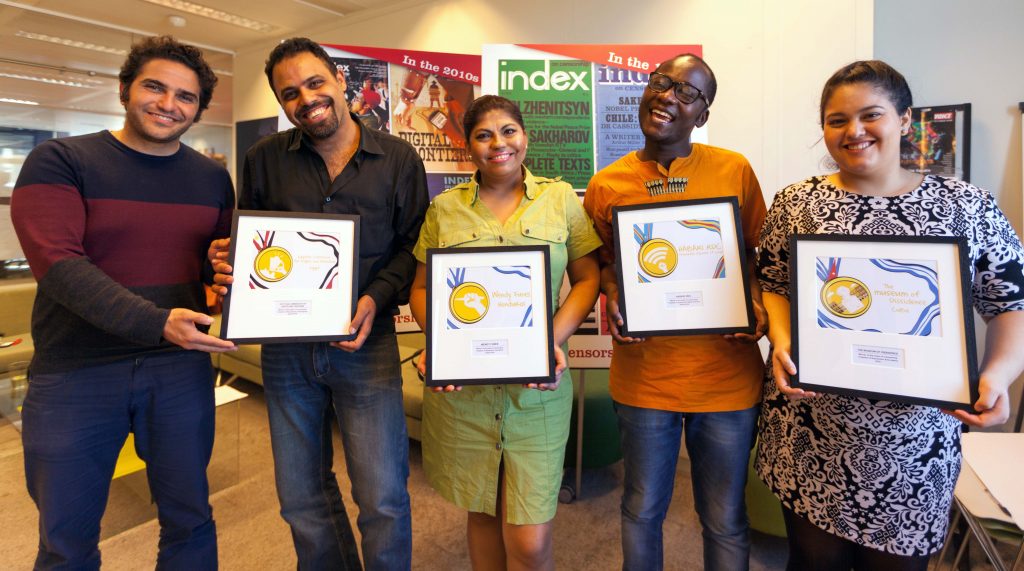
From right: Human rights defenders Mohamed Sameh and Ahmad Abdallah of 2018 Freedom of Expression Campaigning Award-winning Egypt Commission on Rights and Freedoms; 2018 Freedom of Expression Journalism Award-winning Honduran investigative journalist Wendy Funes; Congolese digital activist Guy Muyembe of 2018 Freedom of Expression Digital Activism Award-winning Habari RDC; Perla Hinojosa, Fellowship and Advocacy Officer at Index on Censorship, holds the 2018 Freedom of Expression Arts Award for Cuban arts collective Museum of Dissidence, who could not attend the Freedom of Expression Awards. (Photo: Index on Censorship)
“These winners deserve global recognition for their amazing work,” said Index on Censorship CEO Jodie Ginsberg. “Like all those nominated, they brave massive personal and political hurdles simply so that others can express themselves freely.”
Drawn from more than 400 public nominations, the winners were presented with their awards at a ceremony at The Mayfair Hotel, London, hosted by “stand-up poet” Kate Fox.
Actors, writers and musicians were among those celebrating with the winners. The guest list included The Times columnist and Chair of Index David Aaronovitch, BBC presenter Jonathan Dimbleby, comedian Shazia Mirza, social human rights activists Nimco Ali and Sara Khan, Serpentine Galleries CEO Yana Peel, poet Sabrina Mahfouz, Channel 4’s Lindsey Hilsum and more.
Winners were presented with cartoons created by Khalid Albaih, a Romanian-born Sudanese social media based political cartoonist who considers himself a virtual revolutionist.
Each of the award winners will become part of the fourth cohort of Freedom of Expression Awards fellows. They join last year’s winners — Chinese political cartoonist Rebel Pepper (arts); Russian human rights activist Ildar Dadin (campaigning); Digital collective Turkey Blocks (digital activism); news outlet Maldives Independent and its former editor Zaheena Rasheed (journalism) — as part of a world-class network of campaigners, activists and artists sharing best practices on tackling censorship threats internationally.
Through the fellowship, Index works with the winners – both during an intensive week in London and the rest of the awarding year – to provide longer term, structured support. The goal is to help winners maximise their impact, broaden their support and ensure they can continue to excel at fighting free expression threats on the ground.
This year’s panel of judges included Razia Iqbal, a journalist for BBC News, Tim Moloney QC, deputy head of Doughty Street Chambers, Yana Peel, CEO of the Serpentine Galleries, and Eben Upton CBE, a founder of the Raspberry Pi Foundation and CEO of Raspberry Pi.
Awards judge Eben Upton said: “”The ability to speak freely is a key foundation of democratic society and the rule of law: absent the ability to openly identify the abuse of power, extractive economic conditions, and exclusive political institutions, proliferate. This is why freedom of expression is so precious, and so often under attack from those in power.”
This is the 18th year of the Freedom of Expression Awards. Former winners include activist Malala Yousafzai, cartoonist Ali Ferzat, journalists Anna Politkovskaya and Fergal Keane, and Bahrain Center for Human Rights.
Ziyad Marar, President of Global Publishing at SAGE said: “The protection and promotion of free speech is a belief firmly entrenched within our values at SAGE. As both publisher of the magazine and sponsors of tonight’s awards, we are proud to support Index in their mission as they defend this right globally. We offer our warmest congratulations to those recognised and remain both humbled and awed by their inspirational achievements.”
Further details about the award winners are below.
For interviews with the award winners, who are in London until Friday 20 April, please contact Sean Gallagher at [email protected].
Photographs and other content related to the awards night will be available beginning 11am on Friday 20 April. Please contact Sean Gallagher at [email protected].
Index on Censorship is grateful for the support of the 2018 Freedom of Expression Awards sponsors: SAGE Publishing, Google, Private Internet Access, Edwardian Hotels, Vodafone, Vice News, Doughty Street Chambers and former Index Award-winning Psiphon.
Index on Censorship Freedom of Expression Awards 2018 – background on winners
Arts – The Museum of Dissidence (Cuba)
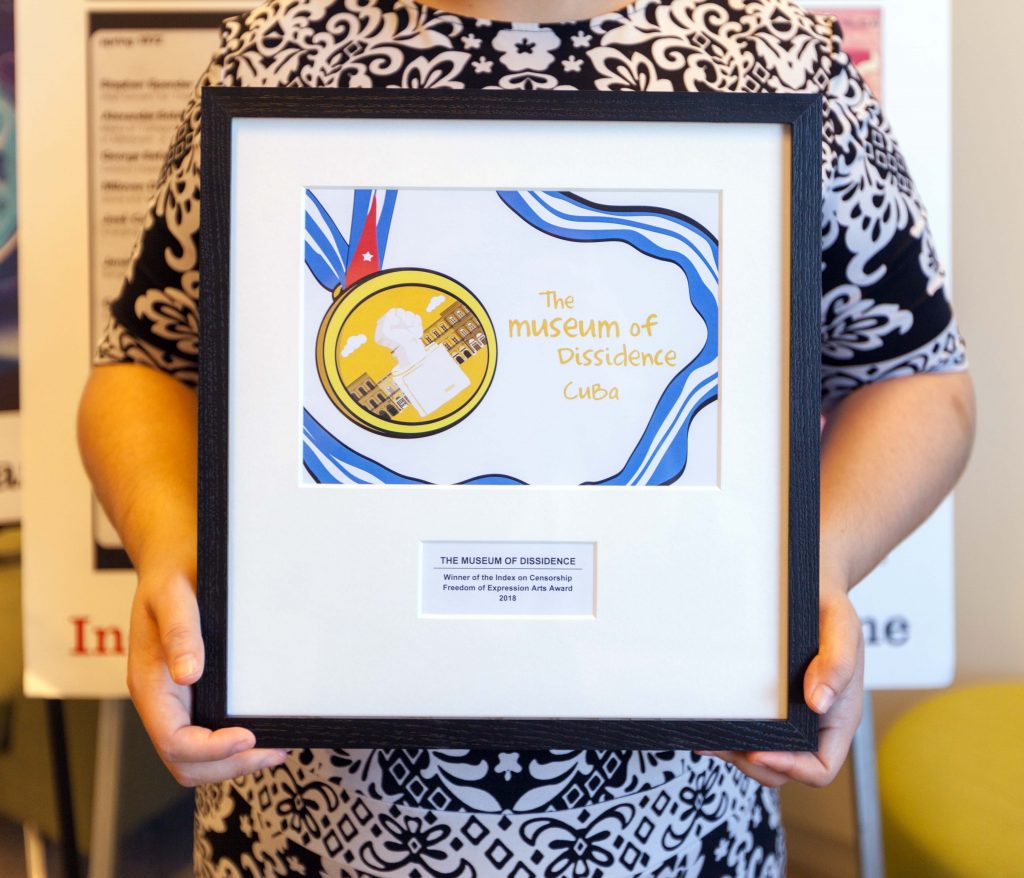
Perla Hinojosa, Fellowship and Advocacy Officer at Index on Censorship, holds the 2018 Freedom of Expression Arts Award for Cuban arts collective Museum of Dissidence, who could not attend the Freedom of Expression Awards. (Photo: Index on Censorship)
The Museum of Dissidence is a public art project and website celebrating dissent in Cuba. Set up in 2016 by acclaimed artist Luis Manuel Otero Alcántara and curator Yanelys Nuñez Leyva, their aim is to reclaim the word “dissident” and give it a positive meaning in Cuba. The museum organises radical public art projects and installations, concentrated in the poorer districts of Havana. Their fearlessness in opening dialogues and inhabiting public space has led to fierce repercussions: Nuñez was sacked from her job and Otero arrested and threatened with prison for being a “counter-revolutionary.” Despite this, they persist in challenging Cuba’s restrictions on expression.
CEO of Serpentine Galleries and 2018 Freedom of Expression Award judge Yana Peel said: The Museum of Dissidence in Cuba is incredibly important for the safe space that it is providing for unsafe ideas. It is a tremendous platform through which the great artists of Cuba bring Cuba to the global stage.”
Profile
Campaigning – The Egyptian Commission for Rights and Freedoms (Egypt). Award supported by Doughty Street Chambers
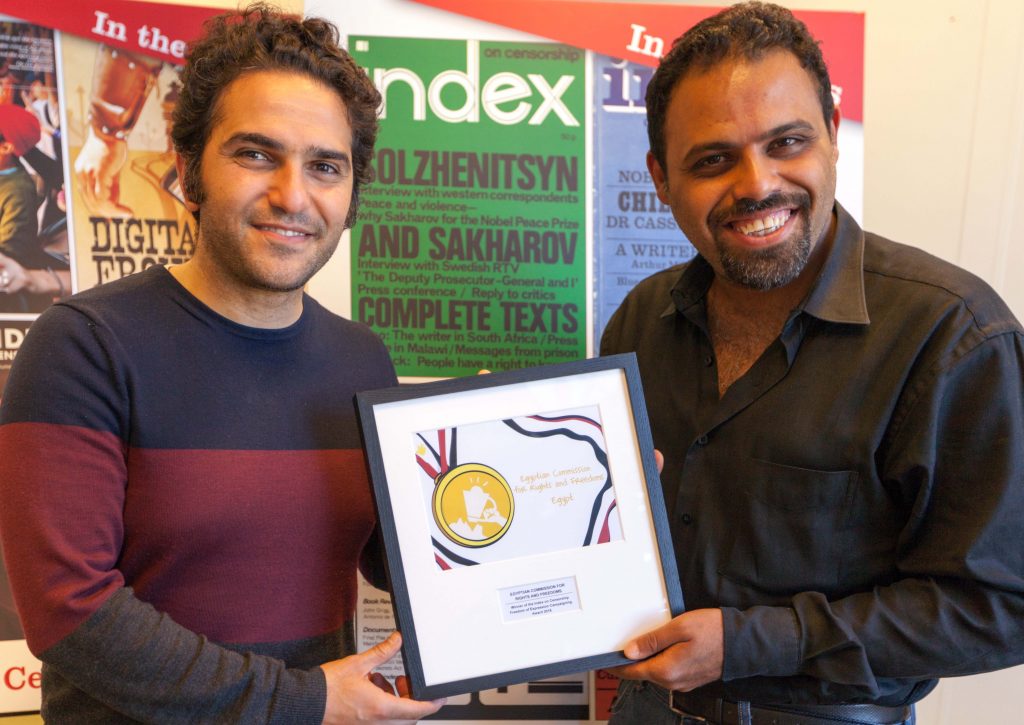
Human rights defenders Mohamed Sameh and Ahmad Abdallah of 2018 Freedom of Expression Campaigning Award-winning Egypt Commission on Rights and Freedoms. (Photo: Index on Censorship)
The Egyptian Commission for Rights and Freedoms is one of the few human rights organisations still operating in a country which has waged an orchestrated campaign against independent civil society groups. Egypt is becoming increasingly hostile to dissent, but ECRF continues to provide advocacy, legal support and campaign coordination, drawing attention to the many ongoing human rights abuses under the autocratic rule of President Abdel Fattah-el-Sisi. Their work has seen them subject to state harassment, their headquarters have been raided and staff members arrested. ECRF are committed to carrying on with their work regardless of the challenges.
CEO of Raspberry Pi and Freedom of Expression Awards 2018 judge Eben Upton said: “In an environment when organisations have had to step back or disappear altogether, they’ve managed to keep going and just that persistence over a period of time in a difficult environment is inspiring”.
Profile
Digital Activism – Habari RDC (Congo). Award sponsored by Private Internet Access
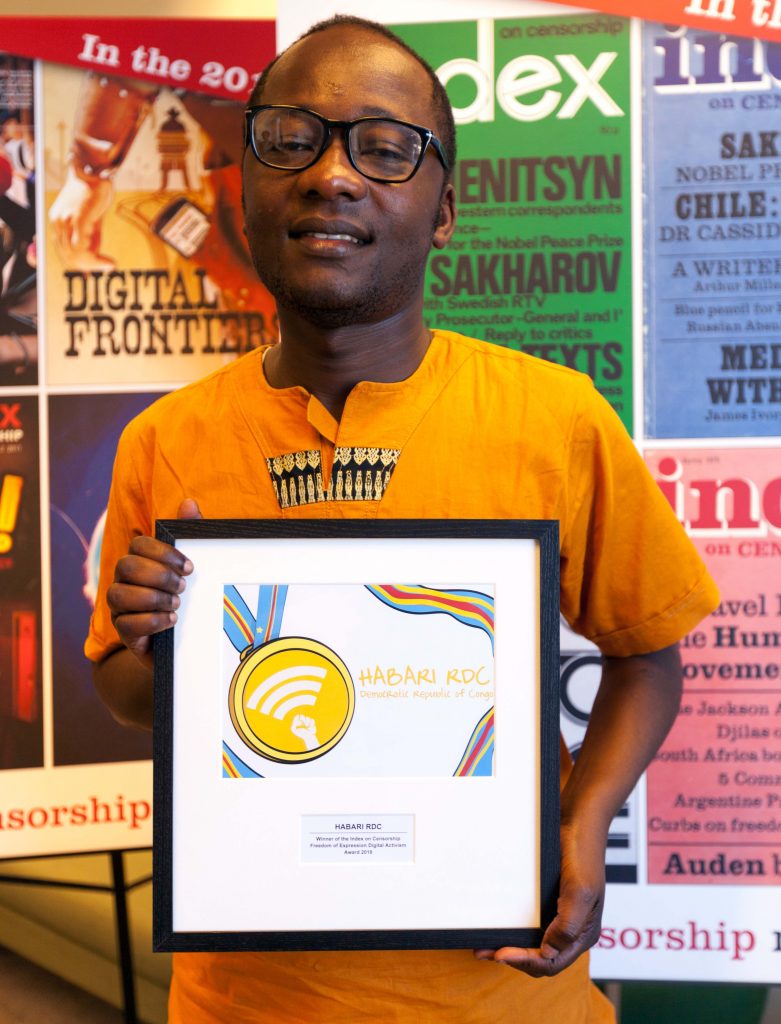
Congolese digital activist Guy Muyembe of 2018 Freedom of Expression Digital Activism Award-winning Habari RDC (Photo: Index on Censorship)
Launched in 2016, Habari RDC is a collective of more than 100 young Congolese bloggers and web activists, who use Facebook, Twitter and YouTube to give voice to the opinions of young people from all over the Democratic Republic of Congo. Their site posts stories and cartoons about politics, but it also covers football, the arts and subjects such as domestic violence, child exploitation, the female orgasm and sexual harassment at work. Habari RDC offers a distinctive collection of funny, angry and modern Congolese voices, who are demanding to be heard.
Journalist and 2018 Freedom of Expression Awards judge Razia Iqbal aid: “They’re doing something which is actually very hard to do, which is make sure that the future generation know what’s happening in their own country, are willing to speak to each other about it and be active politically”.
Profile
Journalism – Wendy Funes (Honduras). Award sponsored by VICE News
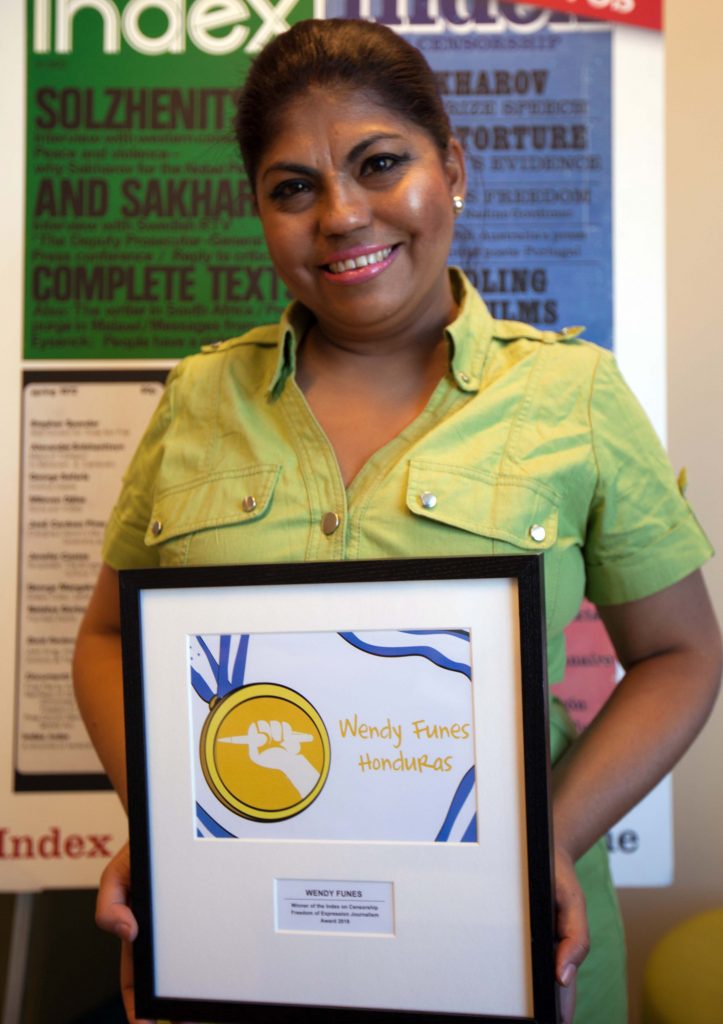
2018 Freedom of Expression Journalism Award-winning Honduran investigative journalist Wendy Funes. (Photo: Index on Censorship)
Wendy Funes is an investigative journalist from Honduras who regularly risks her life for her right to report on what is happening in the country, an extremely harsh environment for reporters. Two journalists were murdered in 2017 and her father and friends are among those who have met violent deaths in the country – killings for which no one has ever been brought to justice. Funes meets these challenges with creativity and determination. For one article she had her own death certificate issued to highlight corruption. Funes also writes about violence against women, a huge problem in Honduras where one woman is killed every 16 hours.
Journalist and 2018 Freedom of Expression Awards judge Razia Iqbal QC said: “She is courageous in the face of death threats. She is courageous in the face of censorship. She is courageous just in terms of getting up every morning and saying I’m going to continue to do what I am doing.”
Profile
ABOUT THE FREEDOM OF EXPRESSION AWARDS AND FELLOWSHIP
The Index on Censorship Freedom of Expression Awards recognise those individuals and groups making the greatest impact in tackling censorship worldwide. Established 18 years ago, the awards shine a light on work being undertaken in defence of free expression globally. Often these stories go unnoticed or are ignored by the mainstream press. Through the fellowship, Index works with the winners – both during an intensive week in London and the rest of the awarding year – to provide longer term, structured support. The goal is to help winners maximise their impact, broaden their support and ensure they can continue to excel at fighting free expression threats on the ground.
ABOUT INDEX ON CENSORSHIP
Index on Censorship is a UK-based nonprofit that campaigns against censorship and promotes free expression worldwide. Founded in 1972, Index has published some of the world’s leading writers and artists in its award-winning quarterly magazine, including Nadine Gordimer, Mario Vargas Llosa, Samuel Beckett and Kurt Vonnegut. Index promotes debate, monitors threats to free speech and supports individuals through its annual awards and fellowship program.
5 Apr 2018 | Awards, Fellowship, Fellowship 2018, News and features
[vc_row][vc_column][vc_video link=”https://youtu.be/qqxJndjCWmg”][vc_column_text]
Launched in 2016, Habari RDC is a collective of more than 100 young Congolese bloggers and web activists, who use Facebook, Twitter and YouTube to give voice to the opinions of young people from all over the Democratic Republic of Congo.
The aim of these citizen bloggers is to bear witness to what is happening in every corner of the country, which is plagued by extreme poverty, corruption, and violence.
Congo has been racked by civil war for the last 20 years. According to the International Red Cross, Congo had almost a million new displacements in 2016 because of conflict and armed attacks — the highest in the world.
The population is also overwhelmingly young. Some 64% of the population in Congo are under 24 and 42.2% under 14. Average life expectancy for men is 47 and 51 for women. The country also receives little international coverage. Newspapers within the country are controlled by political factions, and up until now, radio has been the most reliable source of information.
Against this background, Habari RDC is an incredibly ambitious project led by young, digitally savvy and opinionated Congolese men and women with a belief in free expression and non-violence. For the last year, they have been using the internet and all the technology at their disposal to talk about what their country is really like and how they would like it to be.
“We want to create a society in which young people are tolerant of each other. In which young people are not manipulated by politicians for their personal interests, because young people represent hope for the country. In our societies, young people are unfortunately used and set against each other to serve egotistical old people.We fight for human rights and the participation of young people in the running of the country. We dream of a young president who will work for the country and not a young egoist.” Habari creators told Index.
The site posts stories and cartoons about politics, but it also covers football, the arts and subjects such as domestic violence, child exploitation, the female orgasm, and sexual harassment at work. It is funny, angry, modern: a collection of irreverent, young distinctive Congolese voices, demanding to be heard in the world.
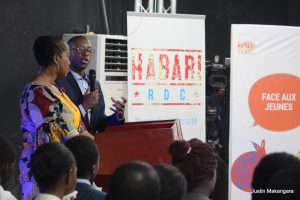
Habari has grown and expanded into an established blogging site and source of activism during 2017, covering a wide range of social and political issues. One of its achievements was encouraging voter registration in Walikale Territory where, in the past, not only has registration been low, but people have disappeared from the register. This eastern part of the country is also very cut off. Habari wrote an article about this on their blogging site and as a result, they reported, a local MP put pressure on the government. In the end, according to Habari, 290,000 people there were registered to vote, including 140,000 women. They also help individuals – for instance raising the plight of a woman who was raped and rejected by her family. And have reported on the suppression of the internet; and the use of road taxes to arm militias.
On their nomination for the Index Awards, Habari creators said, “This award represents for us two things at once: the great honor of a recognition of the work of 100 young Congolese bloggers from 100 different corners of the DRC who want to change the living conditions of their peers by raising their voices thanks to internet . But this award is also a challenge to do more.”
See the full shortlist for Index on Censorship’s Freedom of Expression Awards 2018 here.[/vc_column_text][/vc_column][/vc_row][vc_row full_width=”stretch_row_content” equal_height=”yes” el_class=”text_white” css=”.vc_custom_1490258749071{background-color: #cb3000 !important;}”][vc_column width=”1/2″][vc_custom_heading text=”Support the Index Fellowship.” font_container=”tag:p|font_size:28|text_align:center” use_theme_fonts=”yes” link=”url:https%3A%2F%2Fwww.indexoncensorship.org%2Fsupport-the-freedom-of-expression-awards%2F|||”][vc_column_text]
By donating to the Freedom of Expression Awards you help us support
individuals and groups at the forefront of tackling censorship.
Find out more
[/vc_column_text][/vc_column][vc_column width=”1/2″ css=”.vc_custom_1521479845471{background-image: url(https://www.indexoncensorship.org/wp-content/uploads/2017/05/2017-awards-fellows-1460×490-2_revised.jpg?id=90090) !important;background-position: center !important;background-repeat: no-repeat !important;background-size: cover !important;}”][/vc_column][/vc_row][vc_row][vc_column][vc_basic_grid post_type=”post” max_items=”4″ element_width=”6″ grid_id=”vc_gid:1522917883563-1453e0af-5b06-2″ taxonomies=”10735″][/vc_column][/vc_row]









